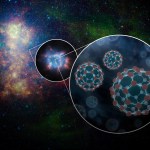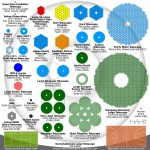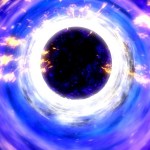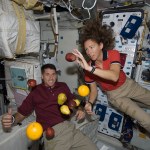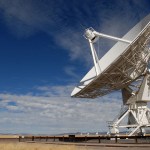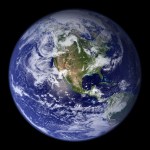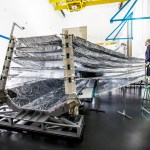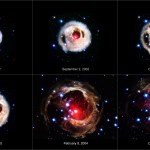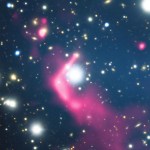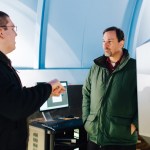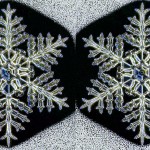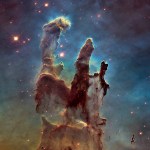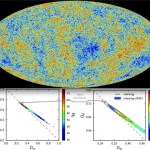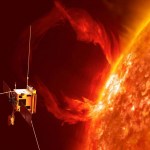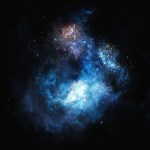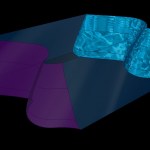
“There is a voice inside of you
That whispers all day long,
‘I feel this is right for me,
I know that this is wrong.’” -Shel Silverstein
When it was first proposed in 1973 by Brandon Carter, there were only two simple statements that one could hardly disagree with concerning the anthropic principle:
1.) We must be prepared to take account of the fact that our location in the Universe is necessarily privileged to the extent of being compatible with our existence as observers.
2.) The Universe (and hence the fundamental parameters on which it depends) must be as to admit the creation…
"For my confirmation, I didn't get a watch and my first pair of long pants, like most Lutheran boys. I got a telescope. My mother thought it would make the best gift." -Wernher von Braun
Sure, going to space is great for overcoming Earth’s atmosphere, but it’s no substitute for the sheer size of what we can build on the ground. The current record-holder for largest telescope is 10.4 meters in diameter, and that takes 36 hexagonal segments to get there. But single mirrors can be cast up to about 8 meters in diameter. Thanks to a revolutionary design, the Giant Magellan Telescope will stitch 7…
"Work gives you meaning and purpose and life is empty without it." -Stephen Hawking
Throw a book into a black hole, and the information must somehow wind up inside. Same goes for a star, a planet, or even a single proton: that information must be maintained. But allow enough time to pass, and quantum theory and general relativity, combined, predict something troubling: that black hole will decay, and none of the information will come out in the decay products.
While Einstein's theory makes explicit predictions for a black hole's event horizon and the spacetime just outside, quantum…
"Men of genius are often dull and inert in society; as the blazing meteor, when it descends to earth, is only a stone." -Henry W. Longfellow
When you look at the meteors striking Earth today, as well as over the past 466 million years, you find something surprising: they don’t line up with the population of near-Earth asteroids we find in our Solar System today. In fact, more than 80% of the meteorites we find on Earth’s surface are entirely of the wrong class.
An H-Chondrite from Northern Chile shows chondrules and metal grains. This meteorite is high in iron, and is the most common type…
“I hope that in this year to come, you make mistakes. Because if you are making mistakes, then you are making new things, trying new things, learning, living, pushing yourself, changing yourself, changing your world. You're doing things you've never done before, and more importantly, you're doing something.” -Neil Gaiman
Here we are, at the end of a momentous week here at Starts With A Bang! The world is changing; the president of the world's most powerful nation has changed; but the quest to learn ever more about the Universe still continues unabated. There's so much coming down…
"It was a strange lightness, a drifting feeling. Zero gravity. I understood that everything that once seemed solid and immovable might just float away." -Lisa Unger
If you want to experience zero gravity, all you need to do is go to space, turn your rocket off and feel that weightless sensation, right? Except, from up there in Earth’s orbit, the gravitational force on you is still almost as great as it is on Earth’s surface! You still accelerate down towards the center of the Earth, not quite at 9.8 m/s^2, but not by much less.
Astronauts, and fruit, aboard the International Space Station.…
“It's so easy to become a grumbler, someone who condemns and carps at everything on principle and sees an ulterior motive behind it.” -Eric Metaxas
If we find out that we truly are alone in the Universe, whether there’s no other life, intelligent life, or spacefaring life, there’s no doubt that makes us special. But does that make us divinely chosen? Or, even more to the point, does that mean that the Universe was designed to give rise to human beings; with us in mind as the end goal? That isn’t necessarily a question we can know the answer to, but it’s something we can approach with science…
"There are now dozens of hockey sticks and the all come to the same basic conclusion. The recent warming does appear to be unprecedented as far bas as we can go. But even if we didn't have that evidence, we would still know that humans are warming the planet, changing the climate and that represents a threat if we don't do something about it." -Michael Mann
The latest climate science results are out, and 2016 was the hottest year on record. Again. Breaking the previous record... from 2015. Which broke the previous record of 2014. In fact, of the 17 hottest years on record, 16 of them have…
"One way or another the first stars must have influenced our own history, beginning with stirring up everything and producing the other chemical elements besides hydrogen and helium. So if we really want to know where our atoms came from, and how the little planet Earth came to be capable of supporting life, we need to measure what happened at the beginning." -John Mather
Launching in October of 2018, the James Webb Space Telescope will revolutionize our conception of the Universe. The biggest scientific find that we know it can uncover is how the Universe came to be the way it is today. How…
"We have chased away the clouds, the sky is all 'rose.'" -Francois Hollande
When you have a light curve with two different large, periodic dips in it, a binary star system is the likeliest explanation. The stars eclipse, and in the case where they're so close their envelopes touch, they're known as contact binaries. That, alone, is enough to make a system spectacular.
Contact binaries come in all sorts of different masses and sizes, but cannot be directly observed or resolved by current telescopes. Image credit: ESO/L. Calçada.
But in the case of this system, KIC 9832227, the orbital…
"Speculating and predicting what lies beyond the boundary is fascinating. Finding out is even more fascinating." -Wallace H. Tucker
When two galaxy clusters collide, there are a slew of cosmic certainties you can bet on: all the galaxies will miss one another, the intracluster gases will collide and heat up, and X-rays will be emitted. But on rare occasion, radio emission can be found, too. Which is a puzzle, since that requires electrons to gain an extra factor of 1,000,000 in energy! How can that happen?
The most energetic shock can be clearly seen around one of the galaxies, well-offset…
“Men go abroad to wonder at the heights of mountains, at the huge waves of the sea, at the long courses of the rivers, at the vast compass of the ocean, at the circular motions of the stars, and they pass by themselves without wondering.” -Saint Augustine
Well, another week has gone by -- the second of the year -- here at Starts With A Bang! Hopefully, none of you noticed a drop in the quality or frequency of the science I've been bringing you, because I've had the flu, but I've been working hard to make sure you get all the science you've come to expect. And it's been a tremendous…
"Lives are snowflakes - unique in detail, forming patterns we have seen before, but as like one another as peas in a pod (and have you ever looked at peas in a pod? I mean, really looked at them? There's not a chance you'd mistake one for another, after a minute's close inspection.)" -Neil Gaiman
When you see a snowflake, what you're seeing is a thin crystal of ice, with intricate, hexagonally-symmetric features that reveal themselves under a microscope. Although snowflakes come in a myriad of different shapes and patterns, there's one adage you've heard since you were a kid: that no two…
“The history of astronomy is a history of receding horizons.” -Edwin Hubble
Over its more than 25 year lifetime, the Hubble Space Telescope has shown us what the Universe truly looks like. It’s done so in a myriad of ways, from planets to stars – dying and forming – to galaxies to gravity’s effects to the deepest abysses of blackness of all. Nothing in space is the same as it was before humanity knew Hubble. Yet even the camera most responsible for our iconic images, WFPC2, isn’t the end of the story.
The gravitationally interacting system, Arp 147. Image credit: Arp 147, via NASA, ESA, and…
"In the far, far future, essentially all matter will have returned to energy. But because of the enormous expansion of space, this energy will be spread so thinly that it will hardly ever convert back to even the lightest particles of matter. Instead, a faint mist of light will fall for eternity through an ever colder and quieter cosmos." -Brian Greene
It seems like the simplest, most fundamental quantitative question about the expanding Universe of all: how fast is it expanding? Even though it's been more than 80 years since Hubble's most career-defining discovery, we still don't know the…
"Through basic science literacy, people can understand the policy choices we need to be making. Scientists are not necessarily the greatest communicators, but science and communication is one of the fundamentals we need to address. People are interested." -James Murdoch
Are you scientifically literate? Do you even know what that means? You'll periodically see quizzes designed to assess some measure of science literacy, and they'll usually focus on a slew of general knowledge questions, inevitably decrying what a large fraction of people don't know. But is that a fair assessment of scientific…
"...because that goal will serve to organize and measure the best of our energies and skills; because that challenge is one that we are willing to accept, one we are unwilling to postpone." -John F. Kennedy
The Hubble Space Telescope, for all of its scientific findings and how it revolutionized our understanding of the Universe itself, touched us all in a way that no piece of knowledge could ever encapsulate. In perhaps the greatest find of all, Hubble answered a question that many of us have had on our minds every time we've gazed up at a night sky: what does the Universe actually look…
"The discovery that young galaxies are so unexpectedly bright--if you look for this distinctive green light--will dramatically change and improve the way that we study Galaxy formation throughout the history of the Universe." -Matthew Malkan
Galaxies come in many different colors today: white, blue or red, mostly, depending on the populations of stars inside. But in a very rare set of circumstances, there can be green emissions as well, due mostly to the emission lines of doubly-ionized oxygen. The problem is we only see these in extraordinarily hot regions of the Universe, where ultra-hot…
"Life would be tragic if it weren't funny." -Stephen Hawking
Well, the first week of the year is behind us here at Starts With A Bang! For most people, that means struggling to return from a long holiday break, but in the world of astronomy that means we've just come back from an incredible week of science at the annual American Astronomical Society meeting! We've had an abnormally large number of stories as a result, and you'll be treated to a stream of in-depth, cutting edge stories smattered throughout the rest of the month! Here's what we've covered so far:
Why doesn't Earth's…
“We are part of the universe that has developed a remarkable ability: We can hold an image of the world in our minds. We are matter contemplating itself.” -Sean Carroll
If you take a look at our Universe today, you can learn all sorts of things about it. How the matter in it is distributed, what the radiation is doing, how many and what types of black holes we’ve formed, how much entropy there is, etc. You can also learn how all of those things are evolving into the future and how they were different in the past!
The far distant fates of the Universe offer a number of possibilities, but if…
